HSEE 2021: For those who want to study great humanities
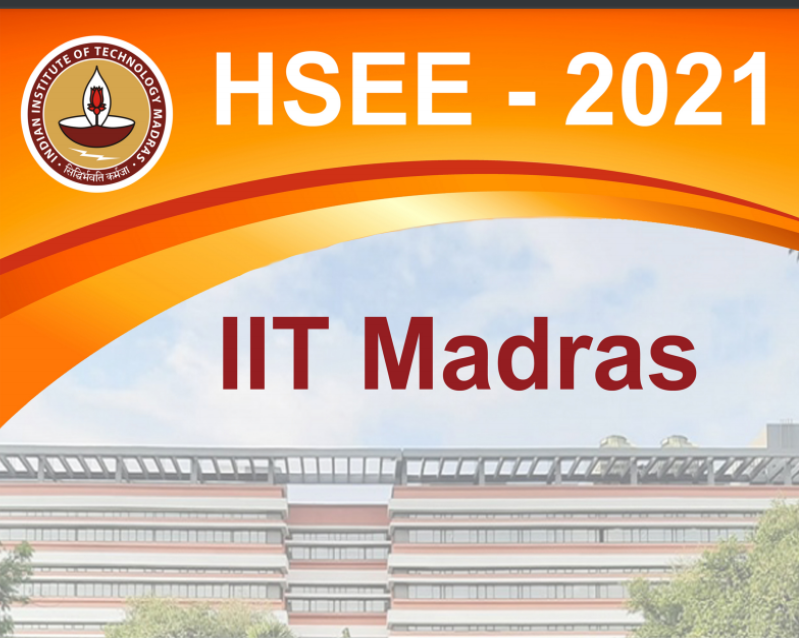
HSEE 2021 exam registration is now open and student willing to pursue humanities courses in IIT Madras can apply till 15 March.
Candidates interested in pursuing Integrated M.A. in Development Studies or Integrated M.A. in English Studies at IIT Madras have to pass HSEE 2021 exam.

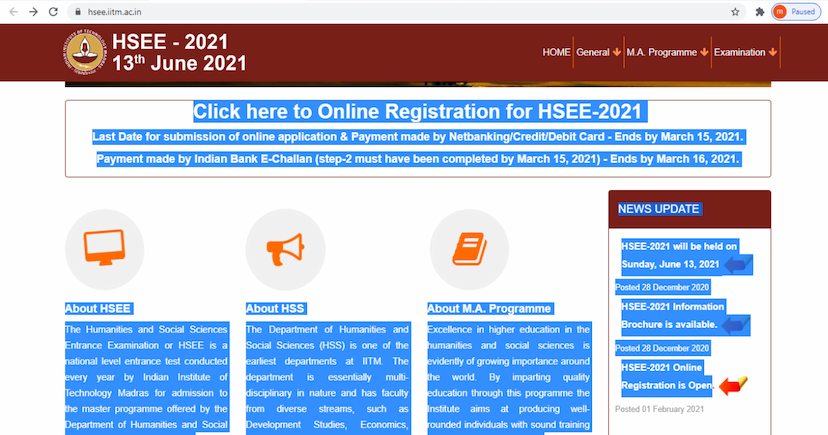
HSEE 2021 will be conducted on 13 June this year.
About the courses
Department of Humanities and Social Sciences of IIT Madras is offering the above said courses.
M.A. in Development Studies
This stream addresses questions of “order and change” in a globalizing world and aims to explore available approaches to fostering development, understood broadly as the goal of providing people the freedom to make their lives better.
This will entail studying the web of relationships humans have with each other and the physical world, which can serve both as a constraint and a source of enormous creativity and ingenuity for achieving sustainable development.

M.A. in English Studies
The English Studies stream has been designed for students with sensitivity for literary and linguistic analyses.
It provides an understanding of literatures in English from around the world with special emphasis on current debates in literary theory, lesser-known literatures and the importance of an interdisciplinary approach.
It aims to introduce students to language, literary and cultural studies, with an emphasis on critical reading skills that would stand a student in good stead whatever he/she may eventually do in life.
Starting with introductory courses in the basics of language and literature, the stream covers the masters of English literary tradition, as well as major writers from other traditions – Asian, African, Latin American and Continental.

A range of genre-based, author-based and period-based courses are offered so that students appreciate different kinds of literature in English in different periods of its history.
About the exam
The Humanities and Social Sciences Entrance Examination (HSEE) is a national level entrance test conducted every year by Indian Institute of Technology Madras for admission to the master programme offered by the Department of Humanities and Social Sciences (HSS) of the Institute.
HSEE 2021 is completely computer based and is usually conducted in the second or third week of April in various cities across India.
The HSEE started in the year 2006 coinciding with the launch of the M.A. programme at IIT Madras.

HSEE 2021 is the only test of its kind, which admits students to a five year integrated masters programme in humanities and social sciences subjects offered by an IIT.
Each of the above course has 29 seats and total number of intake is 58 seats
Eligibility
There are many eligibility conditions for HSEE 2021 and candidates who wish to apply for the exam have to fulfill any one of them.
The eligibility criteria for HSEE 2021 are given below:
# The final examination of the 10+2 system, conducted by a Central or State Board
recognized by the Association of Indian Universities (www.aiuweb.org).
# Intermediate or two-year Pre-University examination conducted by a Board or
University recognized by the Association of Indian Universities.
# Final examination of the two-year course of the Joint Services Wing of the National
Defense Academy.
# Senior Secondary School Examination conducted by the National Institute of Open Schooling with a minimum of five subjects.
# Any Public School, Board or University examination in India or in a foreign country recognized as equivalent to the 10+2 system by the Association of Indian Universities.
# H.S.C. vocational examination.
# Class XII skill courses of CBSE.
# General Certificate Education (GCE) examination (London, Cambridge or Sri Lanka) at the Advanced (A) level.
# High School Certificate Examination of the Cambridge University or International
Baccalaureate Diploma of the International Baccalaureate Office, Geneva.
Point to remember
Candidates who have completed Class XII or equivalent examination outside India or from
a Board not specified above should produce a certificate from the Association of Indian
Universities to the effect that the examination they have passed is equivalent to the Class XII
examination.
In case the Class XII examination is not a public examination, the candidate must have passed
at least one public (Board or Pre-University) examination earlier.
Also read – Most toughest exams in India
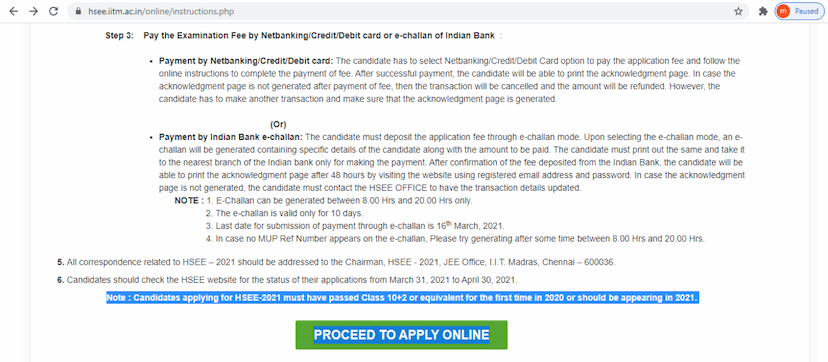
There is some relaxation in case of candidates from SC/ST/PwD categories.
Candidates from above categories will get a relaxation by five years while applying for HSEE 2021.
The date of birth recorded in the 10th class or 12th class marksheet will be considered as authentic.
How to apply
# The application procedure for HSEE 2021 is online. Applicants have to visit the official website of the exam to apply.
# The official website of HSEE 2021 is ‘https://hsee.iitm.ac.in/’
# Soon after the webpage downloads after clicking the above link, candidates can find the button titled ‘Click here to Online Registration for HSEE-2021’ or they can also scroll down and find another button ‘HSEE 2021 online registration is Open’
# Applicants can click any of these two buttons to start registration.
# Post clicking either of the buttons, a new page will download where they will find instructions on how to fill the application form for HSEE 2021.
# After reading the instructions, applicants have to scroll down till the end of the page to find a button titled ‘Proceed to Apply online’ in white colour on green background.
# They can click the button and when new page downloads, applicants will find ‘Login Here’ button located below the text ‘HSEE 2021 New User Registration’
# Candidates can click ‘login here’ button and commence registration by providing their name, date of birth, email, mobile number and create a password and confirm it.
# After confirming the password, applicants can submit the registration form finally.
# Once the registration process is over and username and password are obtained, applicants have to visit the same page where they commenced registration.
# The page url is ‘https://hsee.iitm.ac.in/online/index.php’
# The applicants for HSEE 2021 can see the setup on the right side where they have to enter their username and password obtained during the registration and have to login.
# Post login, applicants can start applying for HSEE 2021 exam.
# After providing the required information in the application form for HSEE 2021 exam, applicants have to pay the registration fee.
# Post confirmation of registration fee payment candidates can check the details in the application form for HSEE 2021.
# If there are any errors, applicants can rectify them and submit the form finally.
# Post final submission, candidates have to wait for confirmation of submission, once the confirmation message is obtained, applicants have to take a printout and preserve it for future use.
Registration fee
The registration fee for the exam is Rs 2,400 for the candidates. The same for candidates from SC/ST and PwD categories is Rs 1,200.
The method to pay the registration fee for HSEE 2021 exam is netbanking, debit card, credit card or Indian Bank E-Challan system.
Documents to be uploaded
The list of documents to be uploaded while filling the application for HSEE 2021 are:
# Scanned image of 10th standard marksheet
# Scanned image of 12th class marksheet (if available)
# Date of birth certificate
# Category certificate (if applicable)
# OBC-NCL-Undertaking (if applicable)
# General – EWS undertaking (if applicable)
# PwD certficate (if applicable)
# Scanned image of the applicant’s photograph
# Scanned image of candidate’s signature
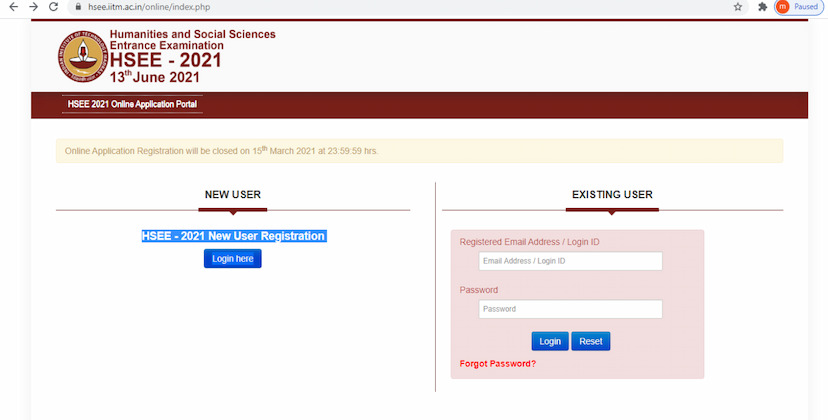
Scanned image of the candidate’s signature must be greater than 10 kb and less than 30 kb and the
dimension of signature image should be 3.5 cm (length) x 1.5 (height) only.
Important dates
The application submission for HSEE 2021 began on 1 February.
The last date for application submission is 15 March. The last date to pay fees for HSEE 2021 through Option A is 15 March.
Last date to pay fees for HSEE 2021 using Option B is 16 March.
The dates to check the status of the application form for HSEE 2021 is 31 March to 30 April.
Download of admit cards can be done from 12 May to June 13.
The copy of responses will be available on the official website of HSEE 2021 from June 21 to 5:00 pm of 23 June.
Result for HSEE 2021 exam will be declared on the official website on 28 June.
And, successful candidates can download offer letters from the HSEE 2021 website on 30 June.
Exam pattern
HSEE 2021 will have two parts – Part 1 and Part 2. The total time allotted to answer questions in both parts is three hours and exam will be in online mode.
HSEE 2021 Part 1 will have multiple choice questions from English and Comprehension Skills, Analytical and Quantitative Ability, General Studies and Environment and Ecology.
Part 2 of HSEE 2021 will have a question related to any general topic of relevance on which candidates have to write an essay covering various nuances related to the topic.
Candidates have to be quite careful while answering the questions as there could be a negative marking for a wrong answer in Part 1.
The syllabus
The syllabus for HSEE 2021 exam is given below for both Part 1 and Part 2.
Candidates have to read the lessons related to the subjects mentioned in the syllabus below:
Part 1
English and Comprehension skill
This section tests the candidate’s ability to understand and use standard English, and to appreciate literary language.
Questions are related to reading skills where candidates will be required to read the given passage(s) that aims to test their comprehension skills and answer the comprehension questions.
Grammar section tests the candidate’s knowledge of English grammar including sentence structure and usage, the use of tenses, verb patterns, articles, and active and passive constructions etc.
Vocabulary section is a test of vocabulary and the ability to understand meaning, structure and collocation of words.
Analytical and Quantitative Ability
This section tests the candidate’s analytical skills and quantitative abilities.
Questions are related to Numbers, Algebra, Highest Common Factor (HCF) and Lowest Common Multiple (LCM), Calendar, Basic Statistics – Average, Ratio and proportion, Profit and Loss, Percentages, Simple and Compound Interest, Work and time, Discount, Age sums, linear equations, elementary trigonometry.
Data interpretation, Analytical reasoning, Logical reasoning, Brainteasers and Patterns.
General Studies
This section is intended to test the understanding of some basic economic concepts and awareness of key issues pertaining to the Indian economy with a focus on the developments after independence.
The concepts and issues covered are Understanding the Economy, Scarcity, opportunity cost, resource allocation, economic systems and their characteristics, features of market economies, forces of demand and supply, elasticity of demand and supply.
Main Features of Indian Economy, Natural resources, human resources -population size and composition, literacy and education, occupational distribution.
Major Economic problems: Poverty, Unemployment and Inequality – concepts, measurement, trends, sectoral distribution and policies, inflation – trends, causes and remedies.
Economic Growth and Development, Meaning and measurement of economic growth, stages of development, national income concepts and trends, trends in savings and investment, human development index, national policy on education, health and health care policies.
Planning in India: Five-Year Plans – objectives, priorities and problems.
Sectoral Development: agriculture – Green Revolution and technological changes, current issues and policies; industry-evolution of industrial policies in India (from 1948), strategies for industrial development, public and private sectors, small and medium industries, infrastructure, transport and communication, service sector etc.
Foreign Trade and International Economy: balance of payments, foreign exchange reserves and trade policy, I.M.F., W.T.O., international aid.
Money, Banking and Public Finance: Concepts of money and measures of money supply.
Indian Society and Culture
Structure of Indian Society, Caste, Class and Tribe, Institutions of Marriage, Family and Kinship.
Political institutions, Demographic Indicators and Trends.
Social Change in India, Sanskritization, Modernisation, Westernization and Secularization, Social Movements and Regionalism, Panchayati Raj Institutions & Governance.
Affirmative Action Programme of the Government, Commissions and Policy Interventions.
Medieval and Modern Indian History, Delhi Sultanate and Mughal era, British Raj, Uprising of 1857, Social Reform and Resistance Movements.
Indian National Movement and the Emergence of the Indian nation.
Indian Philosophy and Thinkers: Jainism, Buddhism, Orthodox Systems, Sikhism, Sufism, Gandhi, Swami Vivekananda, Rabindranath Tagore, Sarvepalli
Radhakrishnan.
Indian Traditions and Knowledge Systems: Classical dance forms, Architecture, Education, Ethics, Language and Grammar, Painting, Music, Theatre, Textiles Indian Literature, Mathematical and Medical systems.

Disintegration of Soviet Union, decline of Communism and rise of nationalism.
Arab-Israel conflict, India and the World, NAM and role of India, India-China and India-Pakistan relations, China and the World, conflict and wars.
Democracy and Development, Challenges to democracy, North-South divide on issues of development, UN and its various developmental and peacekeeping
operations.
Nuclearisation and Non-proliferation, India in SAARC and ASEAN, International terrorism, fundamentalism and the War on Terror.
Indo-US relations, New centres of power in Asia, Latin America and Africa.
Hunger and Poverty, Human Rights, Democracy and Development, Environmental degradation and green politics.
Issues of Race, Ethnicity and Gender, Deprived Classes and minority politics; Religion in the contemporary world.
Culture and Civilization, Globalization and changing economic, cultural and political landscape.
Mass media and cultural change, Emergence of various popular mass movements.
Environment and Ecology
Global Environmental Picture, Population Growth, Degradation of Soils, Global Atmospheric Changes, Loss of Biodiversity.
Ecosystems, Structure of Ecosystems, Biotic Structure, Categories of Organisms, Feeding and Non-feeding Relationships, Ecosystems and how they Work.
Elements in Living and Non-living Systems, Energy Laws, Nutrient Cycling.
Pollution, Major forms of Pollution and their Impact, Primary and Secondary Pollutants, Control Strategies, Indoor Pollutants, Global Warming, International Treaties.
Principles of Solar Energy, Hydropower, Wind Power, Biomass Energy, Ocean Thermal Energy, Geothermal Energy and Tidal power.
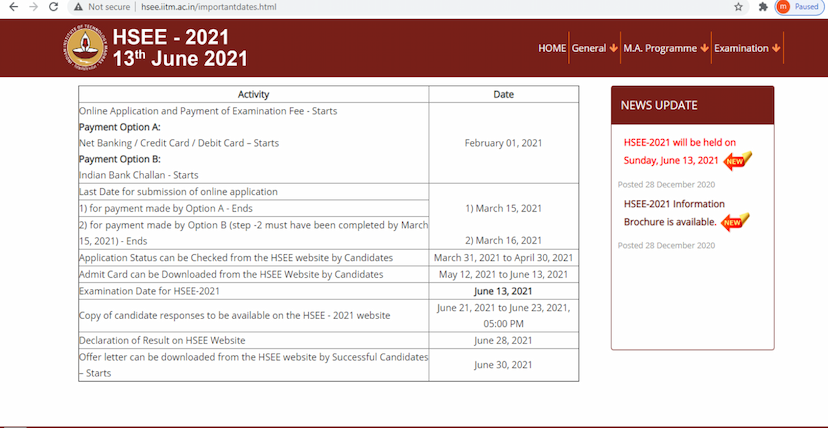
The essay should build an argument, demonstrate a clear perspective and be substantiated
with examples, wherever possible.
The contact
Any queries related to HSEE 2021 exam can be emailed to ‘hsee@iitm.ac.in’
The postal address to send the queries is ‘The Chairman, HSEE 2021, JEE Office, IIT Madras
Chennai–600036.
Phone number is (044) 22578220 and Fax number is (044) 22578224.
The information bulletin for HSEE 2021 is accessible at ‘http://hsee.iitm.ac.in/include/pdf/Brochure_HSEE_2021_V1.pdf’
S Vishnu Sharmaa now works with collegechalo.com in the news team. His work involves writing articles related to the education sector in India with a keen focus on higher education issues. Journalism has always been a passion for him. He has more than 10 years of enriching experience with various media organizations like Eenadu, Webdunia, News Today, Infodea. He also has a strong interest in writing about defence and railway related issues.






